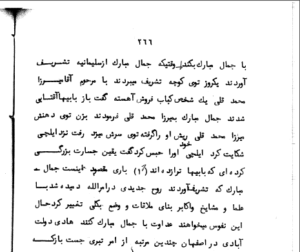Errors and Outright Distortions in Provisional Translations of Baha'i Texts
Provisional translations, is a term used by Baha’is to refer to works and translations that have not yet been verified by the Baha’i administration. Nevertheless, these translations are widely circulated and used by Baha’is. We will refer to a sample here.
Dr. Ḥabīb Mu’ayyad was `Abdu’l-Bahā’s physician for 8 years. He kept a diary of his years with `Abdu’l-Bahā and finally distributed his memoirs in the year 118 Badī` under the title Khātirāt-i Ḥabīb[1] (Ḥabīb’s memoirs). A translation of this book was provided by the prominent Baha’i researcher and translator, Dr. Ahang Rabbani, in his multi-volume work titled: Witnesses to Babi and Bahā’ī History.[2] The third volume of this work is dedicated to Dr. Mu’ayyad’s diary and has been named: Eight Years Near Abdu’l-Bahā: The Diary of Dr. Habib Mu’ayyad. This is what he writes:
One day when Bahā’u’llāh had returned from Sulaymānīyyah, He was walking in the street with the late Āqā Mīrzā Muhammad-Qulī. A kabob-maker had whispered, “Once more the Bābīs have come into the open.” The Blessed Beauty told Mīrzā Muhammad-Qulī, “Rebuke him appropriately!” Mīrzā Muhammad-Qulī grabbed his beard and punished him. The Kabobī took a complaint to the constable, but was thrown in jail and told, “Obviously you must have grievously insulted them for the Bābīs to have punished you in such manner!”[3]
Below is an image from the original Farsi book for comparison:

We already provided the correct translation of this text in Chapter Two, we will repeat it here for the purpose of comparison:
Table 4: Comparison between correct and distorted Baha’i translation of Bahā’u’llāh’s orders to hit a man
Original Farsi | Ahang Rabbani’s Trans. | Correct Trans. |
وقتي جمال مبارك از سليمانيه تشريف آوردند يك روز توي كوچه تشريف مي بردند با مرحوم آقا ميرزا محمدقلي، يك شخص كباب فروش آهسته گفت: باز بابي ها آفتابي شدند. جمال مبارك به ميرزا محمدقلي فرمودند: بزن توي دهنش. ميرزا محمد قلي ريش او را گرفته توي سرش مي زد. رفت نزد ايلچي شكايت كرد. ايلچي خود او را حبس كرد. گفت يقين جسارت بزرگي كرده اي كه بابيها تو را زده اند. | One day when Bahā’u’llāh had returned from Sulaymānīyyah, He was walking in the street with the late Āqā Mīrzā Muhammad-Qulī. A kabob-maker had whispered, “Once more the Bābīs have come into the open.” The Blessed Beauty told Mīrzā Muhammad-Qulī, “Rebuke him appropriately!” Mīrzā Muhammad-Qulī grabbed his beard and punished him. The Kabobī took a complaint to the constable, but was thrown in jail and told, “Obviously you must have grievously insulted them for the Bābīs to have punished you in such manner!” | When his holiness returned from Sulaymaniyah, he was strolling in the street one day with the late Āqā Mīrzā Muḥammad Qulī. A Kabob seller quietly said, “These Bābīs have appeared again!” The Blessed Beauty said to Mīrzā Muḥammad Qulī, “Hit him in the mouth!” Mīrzā Muḥammad Qulī grabbed his beard and started hitting him in the head. [The man] went to the ambassador and complained. The ambassador imprisoned the man (instead of assisting him) and said, “without doubt, you must have greatly insulted the Bābīs that they hit you.” |
Ahang Rabbani has deliberately distorted the meaning of the word hit three times to portray a peaceful Bahā’u’llāh. When confronted with this distortion, Baha’is claim that “hit in the mouth” is also used as slang in Persian to rebuke someone verbally. The context of the quote and the reactions therein clearly show that this meaning was not intended and the poor kabob seller was physically abused by the person executing Bahā’u’llāh’s orders and not verbally. If a verbal rebuking was intended Bahā’u’llāh would have at least prevented his follower from hitting the kabob seller in the head or would have apologized for the harsh response, but he did not and the kabob seller had been forced to take a complaint to the constable.
Furthermore, the word hit has been used three times in the quote and only the first instance could have had two meanings not the others, however the meaning of all three instances has been distorted.
[1] Published by the Iranian Baha’i Publishing Trust (Mu’assisiyi Millī Maṭbū`āt Amrī)
[2] http://bahai-library.com/rabbani_witnesses_history (retrieved 15/1/2014)
[3] Ahang Rabbani, Eight Years Near Abdu’l-Bahā: The Diary of Dr. Habib Mu’ayyad, p. 276: http://bahai-library.com/pdf/r/rabbani_diary_habib_muayyad_2013.pdf (retrieved 15/1/2014)